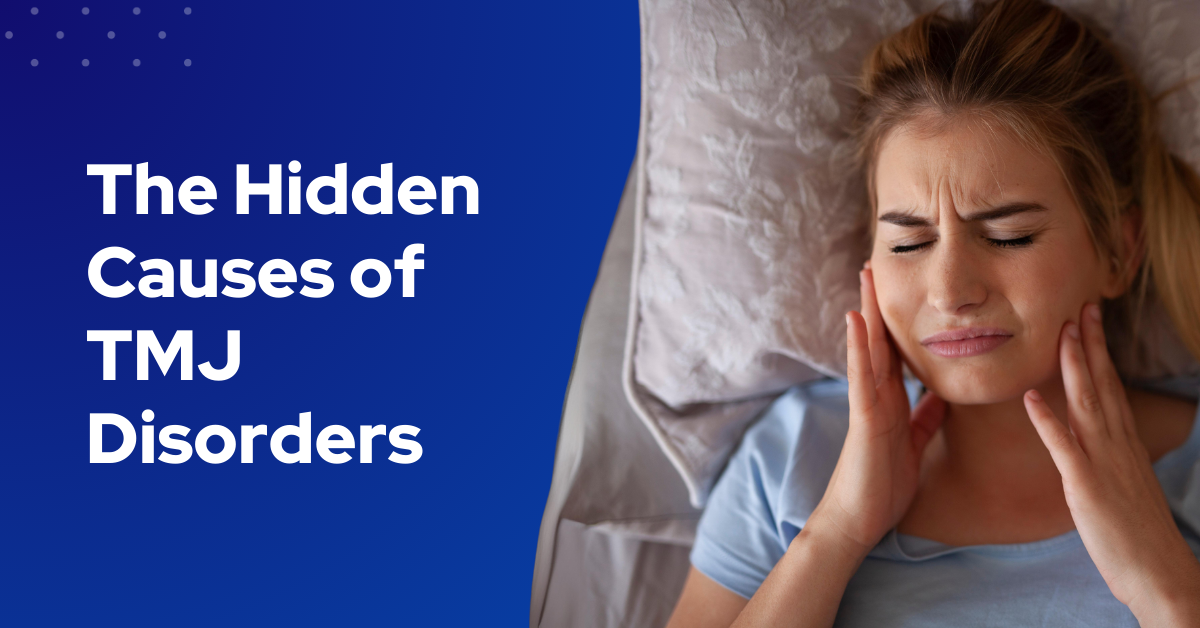Temporomandibular Joint (TMJ) disorders are often misunderstood, with many attributing them solely to stress. However, the roots of temporomandibular disorders (TMD) can be much deeper, some hidden underlying causes are airway issues, sleep disorders, and even improper jaw growth.
Understanding TMD: More Than Just Jaw Pain
TMJ disorder refers to a variety of conditions affecting the jaw joint and surrounding muscles. TMJ disorders can manifest as pain in the jaw, headaches, earaches, and even neck pain. While common triggers include stress and teeth grinding, these symptoms may mask underlying issues that need attention.
The Connection Between Airway Issues and TMD
Airway Obstruction and Jaw Function
-
Airway issues, such as obstructive sleep apnea (OSA) or chronic nasal congestion, can lead to improper jaw positioning. When the airway is compromised, the body often compensates by altering tongue posture and jaw alignment, which can strain the temporomandibular joint.
The Role of Tongue Posture
-
The tongue plays a crucial role in oral and facial development. When the tongue rests improperly—often due to airway issues—it can contribute to misaligned jaws, ultimately affecting TMJ function. Proper tongue posture helps maintain a stable jaw position and optimal airway function. If your tongue is resting improperly in your mouth, a tongue training device like Spot Pal can help.
Sleep Disorders: A Hidden Factor in TMD
The Impact of Sleep Quality
- Poor sleep quality due to sleep disorders like OSA, (Obstructive Sleep Apnea is a sleep disorder that causes the upper airway to partially or completely collapse during sleep, which can lead to reduced or absent breathing.) can lead to muscle tension and jaw clenching, both of which exacerbate TMD symptoms. The cycle of poor sleep, jaw tension, and TMJ pain can be difficult to break without addressing the underlying sleep issue.
Addressing Sleep Disorders for TMJ Relief
- Improving sleep quality can have a profound impact on TMD symptoms. Options such as CPAP therapy for OSA or other sleep interventions can alleviate pressure on the jaw and promote better overall health.
Poor Jaw Growth: The Foundation of TMJ Issues
The Role of Facial Development
- Improper jaw growth, often caused by factors like thumb sucking or prolonged pacifier use, mouth breathing, or improper tongue posture, can lead to malocclusion and strain on the TMJ. An underdeveloped jaw can also contribute to airway obstruction, creating a vicious cycle.
Early Intervention
- Recognizing signs of poor jaw growth in children is crucial. Early intervention through speech and myofunctional therapy can promote proper jaw alignment and airway function, potentially preventing TMD issues later in life.
TMD is often more than just a localized issue; it’s a complex disorder influenced by airway, sleep, and jaw growth factors. By understanding these hidden causes, individuals can seek more effective treatment options and improve their quality of life. If you’re struggling with TMD symptoms, consider consulting a specialist who can evaluate these underlying factors and develop a comprehensive treatment plan.

Share:
Tips for Adjusting to a Mouth Device (Like Spot Pal)
Understanding Different Types of Speech Disorders: A Comprehensive Guide